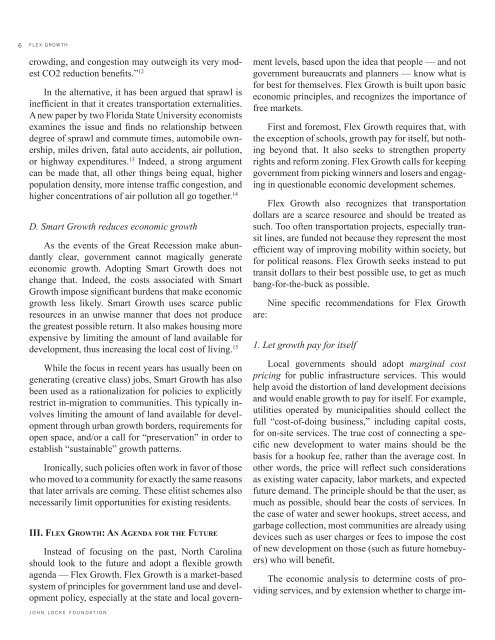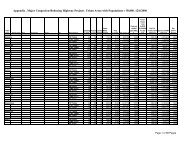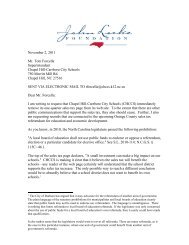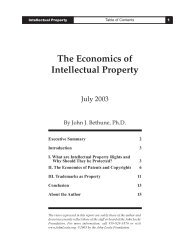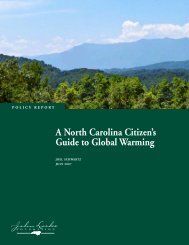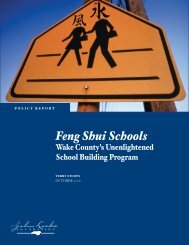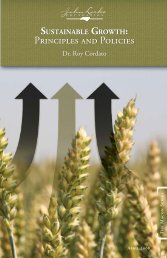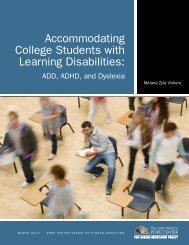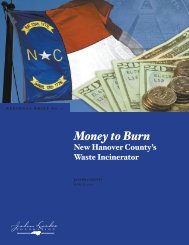Flex Growth - John Locke Foundation
Flex Growth - John Locke Foundation
Flex Growth - John Locke Foundation
You also want an ePaper? Increase the reach of your titles
YUMPU automatically turns print PDFs into web optimized ePapers that Google loves.
6<br />
F L E X G R O W T H<br />
crowding, and congestion may outweigh its very modest<br />
CO2 reduction benefits.” 12<br />
In the alternative, it has been argued that sprawl is<br />
inefficient in that it creates transportation externalities.<br />
A new paper by two Florida State University economists<br />
examines the issue and finds no relationship between<br />
degree of sprawl and commute times, automobile ownership,<br />
miles driven, fatal auto accidents, air pollution,<br />
or highway expenditures. 13 Indeed, a strong argument<br />
can be made that, all other things being equal, higher<br />
population density, more intense traffic congestion, and<br />
higher concentrations of air pollution all go together. 14<br />
D. Smart <strong>Growth</strong> reduces economic growth<br />
As the events of the Great Recession make abundantly<br />
clear, government cannot magically generate<br />
economic growth. Adopting Smart <strong>Growth</strong> does not<br />
change that. Indeed, the costs associated with Smart<br />
<strong>Growth</strong> impose significant burdens that make economic<br />
growth less likely. Smart <strong>Growth</strong> uses scarce public<br />
resources in an unwise manner that does not produce<br />
the greatest possible return. It also makes housing more<br />
expensive by limiting the amount of land available for<br />
development, thus increasing the local cost of living. 15<br />
While the focus in recent years has usually been on<br />
generating (creative class) jobs, Smart <strong>Growth</strong> has also<br />
been used as a rationalization for policies to explicitly<br />
restrict in-migration to communities. This typically involves<br />
limiting the amount of land available for development<br />
through urban growth borders, requirements for<br />
open space, and/or a call for “preservation” in order to<br />
establish “sustainable” growth patterns.<br />
Ironically, such policies often work in favor of those<br />
who moved to a community for exactly the same reasons<br />
that later arrivals are coming. These elitist schemes also<br />
necessarily limit opportunities for existing residents.<br />
III. <strong>Flex</strong> <strong>Growth</strong>: An Agenda for the Future<br />
Instead of focusing on the past, North Carolina<br />
should look to the future and adopt a flexible growth<br />
agenda — <strong>Flex</strong> <strong>Growth</strong>. <strong>Flex</strong> <strong>Growth</strong> is a market-based<br />
system of principles for government land use and development<br />
policy, especially at the state and local government<br />
levels, based upon the idea that people — and not<br />
government bureaucrats and planners — know what is<br />
for best for themselves. <strong>Flex</strong> <strong>Growth</strong> is built upon basic<br />
economic principles, and recognizes the importance of<br />
free markets.<br />
First and foremost, <strong>Flex</strong> <strong>Growth</strong> requires that, with<br />
the exception of schools, growth pay for itself, but nothing<br />
beyond that. It also seeks to strengthen property<br />
rights and reform zoning. <strong>Flex</strong> <strong>Growth</strong> calls for keeping<br />
government from picking winners and losers and engaging<br />
in questionable economic development schemes.<br />
<strong>Flex</strong> <strong>Growth</strong> also recognizes that transportation<br />
dollars are a scarce resource and should be treated as<br />
such. Too often transportation projects, especially transit<br />
lines, are funded not because they represent the most<br />
efficient way of improving mobility within society, but<br />
for political reasons. <strong>Flex</strong> <strong>Growth</strong> seeks instead to put<br />
transit dollars to their best possible use, to get as much<br />
bang-for-the-buck as possible.<br />
Nine specific recommendations for <strong>Flex</strong> <strong>Growth</strong><br />
are:<br />
1. Let growth pay for itself<br />
Local governments should adopt marginal cost<br />
pricing for public infrastructure services. This would<br />
help avoid the distortion of land development decisions<br />
and would enable growth to pay for itself. For example,<br />
utilities operated by municipalities should collect the<br />
full “cost-of-doing business,” including capital costs,<br />
for on-site services. The true cost of connecting a specific<br />
new development to water mains should be the<br />
basis for a hookup fee, rather than the average cost. In<br />
other words, the price will reflect such considerations<br />
as existing water capacity, labor markets, and expected<br />
future demand. The principle should be that the user, as<br />
much as possible, should bear the costs of services. In<br />
the case of water and sewer hookups, street access, and<br />
garbage collection, most communities are already using<br />
devices such as user charges or fees to impose the cost<br />
of new development on those (such as future homebuyers)<br />
who will benefit.<br />
The economic analysis to determine costs of providing<br />
services, and by extension whether to charge im-<br />
J O H N L O C K E F O U N D A T I O N


